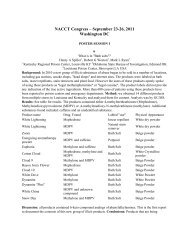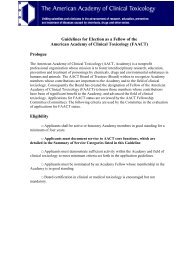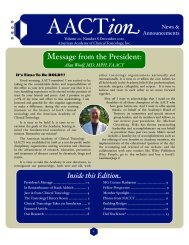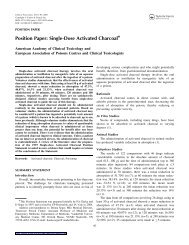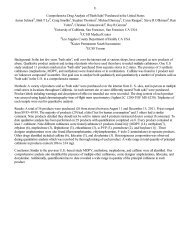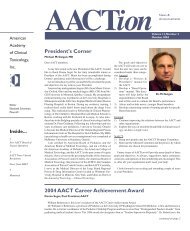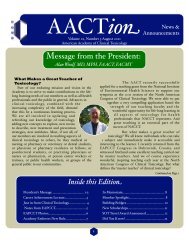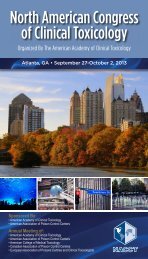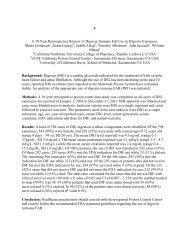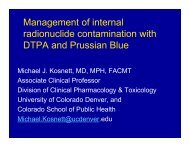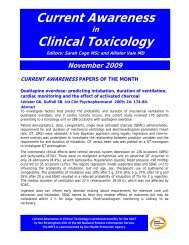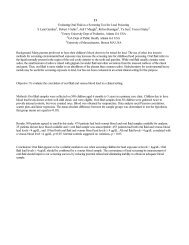Posters IV - The American Academy of Clinical Toxicology
Posters IV - The American Academy of Clinical Toxicology
Posters IV - The American Academy of Clinical Toxicology
You also want an ePaper? Increase the reach of your titles
YUMPU automatically turns print PDFs into web optimized ePapers that Google loves.
to a redesign. Conclusions: An educational program utilizing the medicine safety guidebook will<br />
emphasize teaching areas that were identified during the field test as confusing. In particular, the meanings<br />
<strong>of</strong> drug interactions and auxiliary labels will be clarified to assure comprehension.<br />
275<br />
Developing a Mobile App to Promote the Poison Control Services<br />
Iana M Simeonov 1 , Kristina M Hamm 1 , Stuart E Heard 1<br />
1 UCSF-California Poison Control System, San Francisco CA USA<br />
Background Poison exposure is the 2nd leading cause <strong>of</strong> injury and death to children 0-5 years in the<br />
U.S. However, parents are largely unaware <strong>of</strong> poisoning risks, <strong>of</strong>ten confused about poisoning prevention<br />
strategies and unfamiliar with poison control centers. Over 300,000 mobile apps have been developed in<br />
the last three years. <strong>The</strong> most used mobile apps in the U.S. are games ("gaming"), news, maps, social<br />
networking and music. <strong>The</strong> average smartphone user has 40 apps on their phone. Data from the <strong>American</strong><br />
Association <strong>of</strong> Poison Control Centers shows over-the-counter (OTC) and prescription medications<br />
accounting for the majority <strong>of</strong> exposures in children. In a series <strong>of</strong> recent focus groups, parents also<br />
reported concern around colorful "pills" that can be mistaken for a treat. Objective Choose the most<br />
popular mobile application (app) platform, create and launch a free mobile app, and determine if could be<br />
a valuable part <strong>of</strong> an overall marketing strategy for a poison control program. Methods Consumer<br />
feedback about how people were playing a popular online poison awareness game led to the consideration<br />
<strong>of</strong> a mobile app. Adult consumers described playing along with their children, teachers reported using the<br />
game in elementary and middle school classrooms, and pharmacy students related playing against each<br />
other. An large number <strong>of</strong> consumers reported using an internet browser on a mobile device to play. This<br />
led to the conception, design and coding <strong>of</strong> an app version <strong>of</strong> the game in 3 weeks. Users can also add 1-<br />
800-222-1222 to their contacts list with one click. <strong>The</strong> app was submitted to Apple, vetted and placed in<br />
the Apple App Store in 10 days. A Spanish version has been submitted. A promotion and media strategy<br />
heavily targeting bloggers, tech websites, and health reporters was implemented. Results <strong>The</strong> free English<br />
app, launched for National Poison Prevention Week 2011, had 200 downloads in its first week, reached<br />
1039 downloads within 3 weeks and has a 5 star rating from reviewers. Conclusions <strong>The</strong> first gaming app<br />
for poisoning prevention and service promotion generated over 25 media mentions and articles on<br />
traditional news and blogging sites nationally, raising the visibility <strong>of</strong> poison centers and the issue <strong>of</strong><br />
poisoning prevention. Gaming has enormous potential to help disseminate public health messages in a fun,<br />
engaging and creative way.<br />
276<br />
Poison Center role in responding to a critical drug shortage<br />
Cynthia Lewis-Younger 1 , Denise Becker 2 , MIchelle Rutledge 1 , JoAnn Chambers-Emerson 1 , Katelyn<br />
Dervay 2 , Henry J Pittman 1<br />
1 Florida Poison Information Center- Tampa, Tampa General Hospital, Tampa FL USA<br />
2 Tampa General Hospital, Tampa FL USA<br />
Background: Coral snake envenomation is rare. Even where bites occur most frequently, few hospitals<br />
average more than one bite per year. <strong>The</strong> underlying rate <strong>of</strong> morbidity and mortality is unknown, but bites<br />
are potentially deadly. Only 1 death has occurred since the approval <strong>of</strong> the antivenin, but people who have<br />
received delayed treatment have had neurotoxicity. Some have required ventilator support. In 2003,<br />
Wyeth Pharmaceuticals discontinued manufacturing <strong>of</strong> North <strong>American</strong> Coral Snake Antivenin. All



